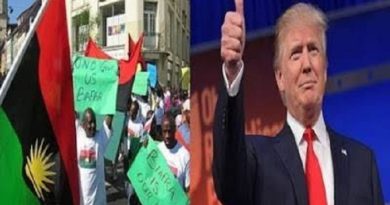Enlarging The Surface Area Of Poverty, Lack And Destitution In Nigeria
The official announcement of the proposal to “shore up” the economy via the instrumentality of a 7.2% hike in Value Added Tax (VAT) on a variety of consumer items and of the thankfully rested re-introduction of payment of toll on a number of the nation’s major highways in the wake of the setting up of a “crack” Economic Advisory Council (EAC) has cast a dark pall on the presumed independence of such a body and a wrong signal considering the quality of advice expected from the famed experts.
In the circumstances, the eggheads may be suspiciously viewed as a façade for providing the theoretical basis for the continuation of the anti-people policies and programmers of the Buhari administration.
The team may be feared positioned to provide Nigerians with the “scientific reasons” for the unhealthy state of the economy and of the requirement to continue to patiently bear the inanities of fitful management of the economy.
The contrived difficulty in running a seamless economy which tell-tale consequences have been the bane of governance in Nigeria will task the moral or ethical compunctions of the “technocratic intellectuals” as it will be required of them to lay bare the shenanigans inherent in the system for all to see.
Their failure to do just that will confirm the people’s projected inability of the body to rally the government into action. They would have disappointed a large section of liberal, progressive and independent thought which believes that progress in action.
This segment of the population does not wish the government to continue to stand still or retreat in the midst of a changing world even as time is running out.
The appointment of such a body as EAC will suggest that the government is ready to subordinate its private predilections to progressive and time-honored prescriptions for reviving an ailing economy – an economy ailed by an illiterate understanding of brazen economic indicators.
The proposed VAT increase and the policy position to re-introduce the Toll Gate regime (which hopefully has been announced annulled) will appear to be inconsistent with a proper understanding of the plight of the ordinary people.
The times are truly hard for people. The impact of the proposed measures will necessitate a spiral increase in the prices of products leading to higher inflation. The people thereby are left with less disposable income. Lower consumption will inevitably ensue and the growth rate will nosedive.
At a time that the government is dawdling on the payment of a miserly #30,000 minimum wage, it will appear that the proposal, particularly regarding VAT, is wrong-headed. Even for the reason only of a concomitant reduction in the purchasing power of the people, conducted by an immediate upward swing in the prices of goods and services, a re-think by the government for focusing on other areas of improving its revenue base will be a better choice.
The policy is predicated on the specious reasoning that all-round economic development of Nigeria can be achieved if the price of petroleum products is even or equal all over the country. Reference to the subsidy in the upstream petroleum industry can only be a reference to subsidy on transportation of products overland from the landing bay to the country’s hinterland.
It must be recognized that the price of imported or locally produced fuel cannot be said to be subsidized as petrol, for instance, has never been sold below its cost or landing price.
The continued retention of the policy even in the face of its obvious unfairness, of the failure of its advertised object, and of its glaring sabotage of the economy will tend to suggest that its introduction was not honest or good-intentioned ab initio.
The policy as a whole has become an incentive to smuggle products across the borders as products purchased at the regulated prices have the advantage of being sold at a premium at the neighboring border community.
More threatening of national cohesion is the fact that the transportation subsidy is only available to North-based marketers because the criteria for participation include the ownership of a retail outlet in the Northern parts of the country. With some luck, some of the products get to their programmed destinations. Most of it may be sold there and then in the Lagos area.
For the purpose of the payment of the subsidy claim, however, the product having been allocated to the North in the first place, is payable to the North-based claimant. If the government is bold enough to stop the payment of petroleum product transportation subsidy, there will be an obvious volume reduction in petroleum product importation with the consequent salutary effect on the national economy.
The advertised volume consumption of petroleum products in Nigeria put at a staggering figure of over 35 million litres per day is patently untrue.
Even as Nigeria has earned the un-enviable credentials of being the world’s poverty capital, the people’s condition at home is not helped or assuaged by the un-feeling policies of the government or by insincere talkativeness or double-talk of arm-chair experts who are chicken-hearted to speak truth to power.
The charge before the members of EAC, this writer humbly submits, is to creatively depart from the beaten tracks that had led no-where and ingenuously invent a new paradigm for recognizing growth and development as important terms or condition of our social contract.
Our yearnings for progressive growth and development properly situate the reasons we individually surrendered our sovereignty in the first place.
The EAC members must perform more courageously and serve their professions or callings nobly than had been the practice of many an egghead in the past.
The bravest thing they could ever do is to be on the side of the people and not pander to the whims of some sanctions-wielding or blackmail-merchandising cabal.
That way, they will assert their professional reputation for honest independence. Otherwise, they will undermine what ordinarily may be observed as their greatest asset. A reasonable choice, on one hand, self-annihilation on the other are the options dangling over their heads like the sword of Damocles.
A transparently honest and noble option is wished this new window of opportunity for slowing down, if not for halting, the growing enlargement of the surface area of blight in Nigeria.




